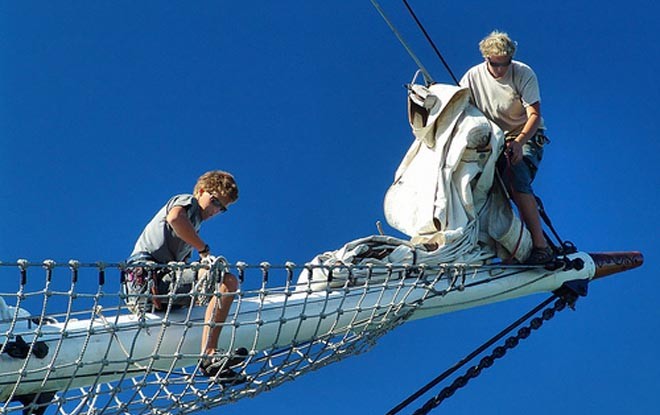Safety of the world's 700 tall-ships in doubt
by Sail-World Cruising round-up on 1 Oct 2011

Crew work on the bow of the ill-fated Concordia - now safety questions are being asked of all tall shipw SW
The safety of the approximately 700 sail-training vessels in the world’s oceans has been called into question by a probe into the sinking of the Canadian tall-ship Concordia off Brazil.
The Transportation Safety Board of Canada is calling for improved training of sailing ship officers after it found the officer in charge of the Concordia didn’t realize the vessel was in danger of sinking. 'Consequently, appropriate action — such as reducing sail or changing course — was not taken before the squall hit,' said board member Jonathan Seymour.
The Concordia capsized and went down on February 17, 2010. The 64 passengers, teachers and crew spent nearly two days in lifeboats before all were rescued by two merchant vessels.
According to a report issued on Thursday by the Transportation Safety Board of Canada, the ship went over and filled with seawater because the officer of the watch was unaware of the danger as a gust of wind approached. He did not reduce sail, change course or order places where water could enter to be sealed.
'With doors, windows and vents left open, water flooded into the hull and the vessel capsized.'
In a report released Thursday in Halifax, the board also found the ship did not sink from a microburst, as the ship’s owner, Class Afloat, had maintained, but from a squall.
'The Transportation Safety Board has found no evidence there was such a microburst,' Seymour said.
It came to the conclusion it was a squall after studying satellite images, checking weather conditions at the time, consulting experts, watching video taken from the ship’s deck and talking with those on board.
'Certainly, conditions were no worse than this vessel would have encountered many times before, during its 20-year history,' Seymour said.
No one factor caused the disaster, he said.
'Rather it was a combination of the inherent limits of the Concordia, a lack of knowledge of these limits on the part of the officers on watch, an associated lack of awareness of developing risks and, consequently, the absence of mitigating action to reduce sail, change course or batten down the hatches.'
The vessel did have a so-called stability handbook on board. The handbook contains information on the conditions under which the ship would become vulnerable in squalls and other poor weather.
But the second officer is not required to know that information or what it means, so he did not understand that the ship was in danger and therefore didn’t take in any sails or change course, said senior board investigator Paulo Ekkebus.
The report showed that the officer was not trained on Concordia’s squall curves, crucial information about the handling and stability of the ship. The material was available on board, but the TSB said the officer was unfamiliar with it and was able to get his certification without learning it.
The board found that the lack of such a requirement is universal. It is calling for Canada to take a lead role in pushing for beefed-up training for all countries that register sail-training vessels.
'It’s a large concern,' TSB senior investigator Paulo Ekkebus said after the report was released in Halifax, noting the agency had identified 700 sail-training vessels registered under various flags.
'Nobody on sail-training vessels, at this time, is required to know that type of information. Not even the master. We’ve not been able to find any country, any flag-state, requiring the study, or for people that they are familiar with this type of information, if it is provided on board the ship.'
Terry Davies, founder of Class Afloat, the owner of Concordia, is also a trustee of Sail Training International, a not-for-profit representing owners of sailing ships used to train young people. In a telephone interview from Montreal, he suggested that many ships go farther than the minimum standards of the countries in which they register.
But he backed the board’s call for stricter standards.
'Clearly, the industry is missing a rule,' he said. 'The [TSB] is making a very clear recommendation to Transport Canada to change that. And I endorse that. But I want to be clear that we were there 10 years ago, 20 years ago. We weren’t waiting for a statute.'
If you want to link to this article then please use this URL: www.sailworldcruising.com/89133